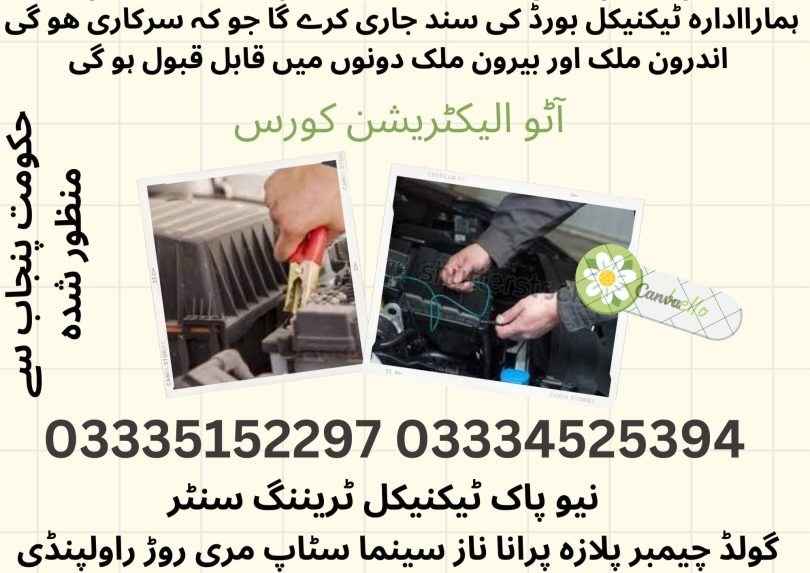
Auto Electrician Course in Rawalpindi Islamabad
An Auto Electrician is a professional who specializes in vehicle electrical systems, including components such as the battery, starter motor, alternator, lights, and electronic control modules. With the rising integration of electronics in modern vehicles, the demand for skilled auto electricians continues to grow. Our auto electrician course in Rawalpindi is tailored to meet this demand, providing in-depth automotive electrician training that equips students with the knowledge and practical skills to diagnose and repair electrical faults in various vehicles.
Course Overview
The Auto Electrician course at NPTTC begins with an introduction to vehicle electrical systems and their components. Students learn core electrical theory, including Ohm’s Law and Kirchhoff’s Law. They study battery types and troubleshooting methods, along with starting systems and ignition switches. The course covers modern electronic control modules. Students practice diagnosing and repairing electrical faults using various tools and techniques. Safety training emphasizes working with high-voltage systems and following protective procedures. The course also includes wiring diagrams with hands-on sessions to reinforce practical skills.

Course Duration
06 | Months
Introduction to Refrigeration & Air Conditioning
Basic Principles of Heat Transfer & Thermodynamics
Vapor Compression Refrigeration Cycle
Components: Compressor, Condenser, Evaporator, Expansion Valve
Refrigerant Properties & Types
Installation of Residential AC & Refrigerator Units
Electrical Components & Controls
Troubleshooting Residential Units
Preventive Maintenance Practices
Safety Procedures & Regulations
Field Visits & Real-World Installations
Practical Hands-on Lab Sessions
ritten & Practical Assessments
Guest Lectures by Industry Professionals
01 | Year
- Introduction to Refrigeration & Air Conditioning
- Basic Principles of Heat Transfer & Thermodynamics
- Vapor Compression Refrigeration Cycle
Absorption - Refrigeration Cycle
- Components: Compressor, Condenser, Evaporator, Expansion Valve
- Refrigerant Properties & Types
- Refrigerant Selection for Applications
- Installation of Residential AC & Refrigerator Units
- Commercial Refrigeration Systems
- Duct Design & System Selection
- Electrical Components & Controls
- Advance Troubleshooting Techniques
- Preventive Maintenance Practices
- Safety Procedures & Regulations
- Green Refrigeration Concepts
- Solar AC Technology
- Environmental Regulations & Refrigerant Management
- Field Visits & Real-World Installations
- Business Skills for Technicians
- Project Management & Team Supervision
Practical Hands-on Lab Sessions - Simulation Exercises for Troubleshooting
- Written & Practical Assessments
- Guest Lectures by Industry
- Professionals
- Opportunity for Cold Chain & Industrial Refrigeration Exposure
Course Outline (6 Months)
Electrical Foundation and Safety
Month 1
- Review and Solidify Concepts
- Recap of electrical fundamentals, battery technology, and basic components.
- Reinforcing safe workshop practices and using electrical tools
Advanced Electrical Principles
Month 2
- Advanced Electrical Principles and Troubleshooting (Part 1)
- A deeper understanding of electrical circuits and their behavior under load.
- Ohm’s Law calculations for voltage, current, and resistance.
- Multimeter usage for measuring voltage, current, and resistance in electrical circuits.
Vehicle Fault Diagnosis Techniques
Month 3
- Advanced Electrical Principles and Troubleshooting (Part 2)
- Advanced troubleshooting techniques using multimeters and other diagnostic tools (introduced gradually).
Components and Systems
Month 4
- Detailed Study of Components (Part 1)
- In-depth study of starters (solenoid, drive gear, motor) and their operation.
- Alternators (construction, working principle, voltage regulation).
Core Electrical and Modern Systems
Month 5
- Detailed Study of Components (Part 2)
- Ignition systems (distributor-based and coil-on-plug systems) – their components and operation.
- Lighting systems (halogen, HID, LED) – their technology and troubleshooting.
- Introduction to sensors and actuators used in modern vehicles (may vary by institute).
Diagnostic Tools and System Analysis
Month 6
- Wiring Diagrams and Diagnostics
- Learning to read and interpret complex wiring diagrams of different car models is common in Pakistan.
- Using wiring diagrams for systematically troubleshooting electrical faults.
- Practical exercises in diagnosing and repairing electrical problems using a combination of knowledge and wiring diagrams.
Course Outline (1-Year)
Months 1–6: Basic Auto Electriction Course in Rawalpindi Islamabad
(Same course content as the 6-month program but with more detail, role-plays, techniques, and assessments.)
Comprehensive Review
Month 7
- Recap of concepts from previous courses to ensure a strong foundation.
- Reinforcing skills in using electrical tools, multimeters, and safe workshop practices.
Advanced Electrical Theory
Month 8
- Advanced electrical theory concepts:
- Magnetism
- Electromagnetism
- Application in automotive systems
- Introduction to troubleshooting complex electrical faults using advanced methodologies.
Interaction and Troubleshooting
Month 9
- In-depth understanding of automotive electrical systems and their interaction.
- Continued development of troubleshooting techniques for complex issues.
Advanced Diagnostics and Techniques
Month 10
- Training on using specialized diagnostic tools:
- Scanners
- Oscilloscopes
- Application of advanced troubleshooting techniques.
Repair and Systems Work
Month 11
- Repairing intricate electrical components and systems in modern vehicles (e.g., ABS, airbags – may vary by institute).
- Hands-on practice with complex diagnostics and repairs.
Advanced Vehicle Systems
Month 12
- Detailed study of Electronic Fuel Injection (EFI) systems, components, and operation.
- Understanding sensors, actuators, and computer-controlled vehicle systems.
- In-depth knowledge of their role in modern vehicle functions.
Evolving Technology:
The automotive industry is constantly evolving, with newer technologies being introduced regularly. Here’s how some courses might adapt:
- Training on Newer Technologies: Institutes might update their curriculum to incorporate training on newer technologies like advanced driver-assistance systems (ADAS) or electric vehicle charging systems, depending on their resources and industry trends.
- Focus on Adaptability: The core curriculum might emphasize the importance of continuous learning and adaptability to stay updated with the ever-changing technological landscape in the automotive electrical field.
Practical Training:
A crucial aspect of auto electrician training is the hands-on experience you gain through practical training. This typically involves:
- Workshop Sessions: Working in a simulated workshop environment, allowing you to practice learned concepts on real vehicles or training equipment.
- Disassembling and Reassembling Electrical Components: Gaining practical knowledge by taking apart and putting together various electrical components like starters, alternators, and ignition systems.
- Fault Simulation and Troubleshooting: Instructors might create simulated electrical faults in the vehicles or training equipment for you to diagnose and repair using the techniques learned.
- Project Work: Some courses might involve working on individual or group projects where you apply your knowledge to diagnose and fix electrical problems in a vehicle.
Additional Considerations:
- Internships: Some institutes might offer internship opportunities to gain real-world experience in workshops alongside qualified auto electricians.
- Career Guidance: Reputable institutes might provide career guidance services to help you explore career options and job placement opportunities after completing the course.
- Cost: Course fees can vary depending on the institute, course duration, and location. It’s always Specialization Options:
As you progress through your studies, you might encounter opportunities to specialize in certain areas. Here are some possibilities:
- Electronic Fuel Injection (EFI) Systems: Gain in-depth knowledge of EFI systems, including fuel injectors, sensors, and computer controls, crucial for modern vehicles.
- Advanced Diagnostics: Master the use of advanced diagnostic tools like scanners and oscilloscopes to pinpoint complex electrical faults quickly and efficiently.
- Electric and Hybrid Vehicles (Emerging Field): Some institutes might offer introductory courses or modules focusing on the electrical systems specific to electric and hybrid vehicles, a growing sector in the automotive industry.
Conclusion
The Auto Electrician Course in Rawalpindi Islamabad offers students practical skills to meet the demands of modern automotive electrical systems. It emphasises hands-on training and advanced diagnostics, preparing learners to earn auto mechanic certification and excel in the field. Graduates can pursue careers in workshops, specialise in electric or hybrid vehicles, or advance toward automotive mechanic certification in a fast-evolving industry.






